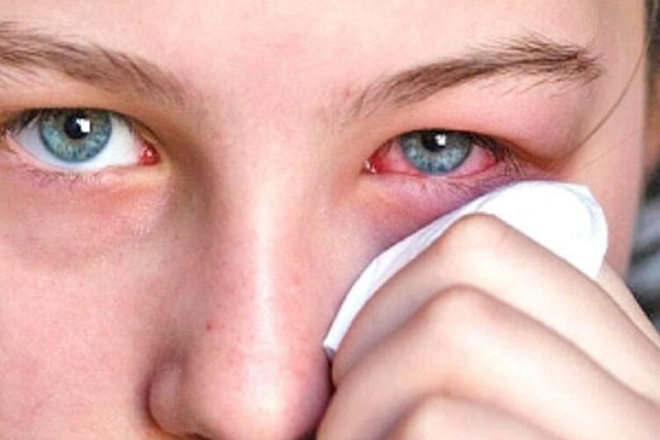Pink eye, also known as conjunctivitis is the inflammation of the conjunctiva, the outer most layers of the eyes and eyelids. About 3 million people in the United States experience pink eye each year.
Pink eye is not a medical condition, but a symptom instead. And it is associated with multiple causes that include bacterial and viral infections.
Fortunately, diagnosing and treating pink eye is comparatively easy. With the effects that pink eye has on your eyes, identifying this condition isn’t difficult. Pink eye may have symptoms in either one or both eyes. Let’s find out what they are.
Common Pink Eye Symptoms
- Light sensitivity or blurred vision that doesn’t subside even after discharge is wiped off from the eyes.
- Itching or burning sensations
- Excessive Tearing
- Sensation of grittiness
- Discharge
- Eyelid swelling
- Pinkish discoloration to the white portion of your eye
- Irritation from contact lenses and constant scratching of the eyes.
Causes of Pink Eye
Viral Conjunctivitis
It is caused by a virus, similar to the common cold. Viral conjunctivitis is often contagious. But the eye starts self-healing within a few days even without medical treatment.
Bacterial Conjunctivitis
As the name suggests, it is caused by bacteria. This type of conjunctivitis can damage the eye if not treated on time.
Allergic Conjunctivitis
Eye irritants like dust, pollen, and animal dander can cause allergic conjunctivitis. This type of conjunctivitis is either seasonal or can flare up around the year.
Pink Eye Treatment
Viral Conjunctivitis
There’s no medical treatment required for viral conjunctivitis and patients can seek treatment at home. Apply a cold, wet washcloth over the eyes throughout the day for relief from the symptoms. Make sure you do not share the washcloth with anyone. It should be disposed off once your symptoms subside.
Bacterial Conjunctivitis
Antibiotic eye drops or ointments are recommended by your eye doctor for effective relief from the symptoms.
Allergic Conjunctivitis
Allergy medications can substantially reduce or prevent bouts of allergic conjunctivitis. These medications should be started before the allergy season or an allergy outbreak begins.
Precautions for Pink Eye
Now that you’re aware of the types of pink and treatment options available for you, it’s also important that you prevent it from occurring in the future. Make sure that you and your family stay safe so that there are no further complications.
Reduce Chances of Getting Pink Eye:
- Personal items like towels, tissues, and washcloths should not be shared with others.
- Cover your mouth and nose when you cough or sneeze and refrain from rubbing or touching your eyes.
- Don’t ever share your contact lenses with anyone, whether it’s friends or family.
- Wash your hands a few times a day especially if you’re at school or a public place. If you don’t have access to water, use wet wipes to clean your hands.
- Keep a sanitizer handy and keep your hands clean at all times.
- Keep all surfaces such as kitchen countertops, bathroom vanities, shared phones, and handles clean with the help of a disinfectant.
- If you suffer from seasonal allergies, ask your doctor about what you can do to minimize and prevent the symptoms.
- If you wear contact lenses, follow your doctor’s instructions for proper lens care. Make sure you use contact lens solutions effectively or switch to daily disposable contacts.
- If you’re going for a swim, put on your goggles to protect your eyes from bacteria and in the water that can cause conjunctivitis.
- Before you take a shower, remove your contact lenses to prevent trapping bacteria between your eyes and lenses.
Learning about the symptoms, causes and precautions of pink eye will take you one step closer to good eye health. Make a conscious effort to encourage a clean and healthy environment for everyone at home and practice the same when you’re stepping out of your house.
If you or your family member has any of the above symptoms, make sure you consult your doctor immediately to seek treatment.
Aaron Barriga is the online marketing manager for Insight Vision Center. With a knack for understanding medical procedures, and an interest in eye and vision health, Aaron loves to share what he knows and what he learns. He blogs with a mission of informing readers about the latest eye care technology and other topics related to eye care and eye health. He loves collecting coasters from the different bars and restaurants he visits during his travels.




